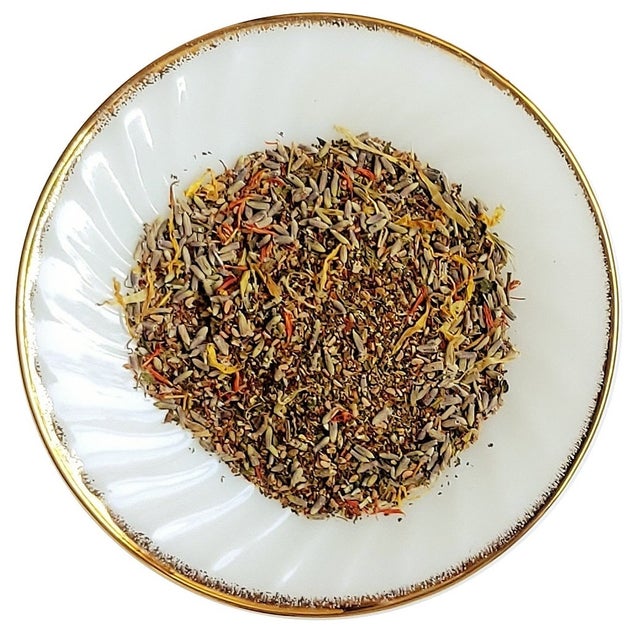- Rooibos Teas
- >
- Ayurvedic Calming
Ayurvedic Calming
SKU:
$12.99
$12.99
Unavailable
per item
Description
2 oz of Smooth spicy notes with the sweet rooibos coming to the fore. Finishing with relaxing lavender. Calm the body, calm the mind.
Tell Me MoreSmooth spicy notes with the sweet rooibos coming to the fore. Finishing with relaxing lavender. Calm the body, calm the mind.
Is there ever enough time in the day? While the question is rhetorical, the sentiment is universal. Busy lives mean busy minds, bodies and spirits. Taking some time for a little selfcare is essential if you want to keep going. Ayurvedic Calming herbal blend is here to help you create some space for yourself, whenever you need it. This luxuriant blend offers a cornucopia of ingredients all prized by Ayurvedic practitioners layered over a soothing, mineral rich Rooibos. Loaded with nettle, believed to function as a nourishing tonic for the body, rosehip, raspberry and licorice for a body-fortifying boost of antioxidants, and a bevy of delectable spices selected for flavor, and their function as body purifiers. To this we've also added delicate flower petals, including lavender, used for centuries to aid sleep and promote relaxation. As you wait for your water to boil, your mind starts to slow down. As you infuse your pot or cup and wait for your tea to brew, your body settles into relaxation mode. As you take your first sip, your spirit eases into a new zone of comfort that lasts for the duration of your cup, and hopefully longer. Be calm. Namaste. |
Brewing for Best ResultsIdeal Brewing Temperature: 209°F/98°C.
Minimum Brewing Temperature: 190°F/89°C. Bring filtered or freshly drawn cold water to 209°F/ 98°C. Place 1 slightly heaping teaspoon of loose tea per 8 oz of fluid water. Steep 5-10 minutes according to taste (the longer the steeping time, the stronger the tea). |
Origin
Tea(s) From: South Africa, Bulgaria, Germany, Poland, Turkey, Egyt, India Region(s): Cederberg, Provdiv, Black Forest, Lodz, Malkara, Nile River Delta, Kerala Ingredients
Luxury Ingredients: Rooibos, Nettle, Rosehip, Raspberry, Licorice root pieces, Anise, Cardamom, Clove, Calendula, Safflower, Lavender petals Iced Tea Instructions
Per Serving: Bring filtered or freshly drawn cold water to 209°F/ 98°C. With and infuser, use 1 slightly heaping teaspoon of loose tea per 6-7 oz of fluid water. Steep 5 minutes. Add filtered hot tea to 16 oz glass filled with ice. (Some luxury teas will turn cloudy when poured over ice). Per Pitcher: Makes 1 Quart. Bring filtered or freshly drawn cold water to 209°F/ 98°C. Place 6 slightly heaping teaspoon of loose tea in a heat resistant container. Pour 1 ¼ cup of prepared water over the tea leaves. Steep 5 minutes. With a fine mesh sieve, filter the hot tea liquor to the serving pitcher filled with ice. Add cold filtered water to top off. (Some luxury teas will turn cloudy when poured over ice). Brewing Tips
Making an amazing cup of tea requires several things. High quality tea, filtered or freshly drawn cold water, correct water temperature, time of infusion, and filters/infusers. Unfiltered water or too hot of water can ruin the best of teas. Always use filtered or freshly drawn cold water. Any flavor from water treatments or heavy minerals such as lime or calcium can taint the water. Brew at the ideal temperature. Too hot of water can scorch the leaves and produce a bitter brew. If you find that the tea is still bitter following the recommended brewing temperature, try lowering the brew temperature another 5 to 10 degrees. Use infusers that allow the tea leaves to fully expand and has full contact with the water. Ditch the tea bags. Know the steeping time for your tea. Too long of steeping can make your tea bitter and undesirable. Too short of time will make a weak tea. Don’t make tea in the microwave. Food Safety
We strongly recommend using filtered or freshly drawn cold water brought to a rolling boil when brewing all types of tea. Today’s water has been known to carry viruses, parasites and bacteria. Boiling the water will kill these elements and reduce the potential incidence of water-borne illness. Cool the water to the ideal brewing temperature before brewing. |

